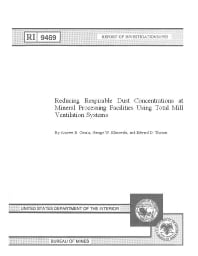Mining Publication: Reducing Respirable Dust Concentrations at Mineral Processing Facilities Using Total Mill Ventilation Systems
Original creation date: January 1993
Authors: AB Cecala, GW Klinowski, ED Thimons
NIOSHTIC2 Number: 20025028
Pittsburgh, PA: U.S. Department of the Interior, Bureau of Mines, RI 9469, 1993 Jan; :1-11
The U.S. Bureau of Mines has designed and evaluated total mill ventilation systems at two different mineral processing operations. Both systems have proven very effective at reducing respirable dust levels throughout the mill in a cost-effective manner. A 25,500-cfm system installed at a clay processing mill provided approximately 10 air changes per hour. This system reduced respirable dust concentrations by approximately 40 pct throughout the mill building. The second evaluation was performed at a silica sand operation. Tests were performed with 50,000 and 100,000 cfm of ventilation to the mill building, corresponding to 17 and 34 air changes per hour. Average mill-wide respirable dust reductions were 36 and 64 pct, respectively. Not only did these systems reduce respirable dust concentrations and increase visibility throughout the mills, they were also easy to install and required minimal maintenance. A total mill ventilation system provides a general purging of the mill air; the system should be viewed as a supplemental technique to assist other dust control systems in operation.

NIOSHTIC2 Number: 20025028
Pittsburgh, PA: U.S. Department of the Interior, Bureau of Mines, RI 9469, 1993 Jan; :1-11